

The best female heroes from the world of Studio Ghibli. If you grew up with Disney you may not have found much to get excited about in female leads.
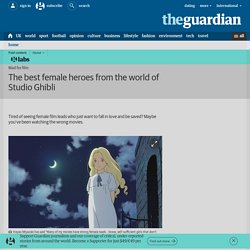
The options for women in traditional family films have always seemed limited to being rescued, falling in love and – here’s the kicker - making a massive sacrifice for both of these things. But there is one studio which has been giving us strong and interesting female characters all along and all from a country where women are often still depicted in traditional gender roles. This is of course Studio Ghibli, which from its very first film – the post-apocalyptic Nausicaä of the Valley of the Wind – has made a distinct point of focusing on and championing strong, intelligent and interesting female characters.
Romantic Comedies Teach Women That Stalking Is A Compliment. Horror Films And Feminism: Women Who Don’t Run From Danger, But Step Up To It (Thank You, Mary Shelley) Something seemingly obvious struck me recently after reading up on some classic Gothic literature in an anthology a friend gave me as an early Halloween present.
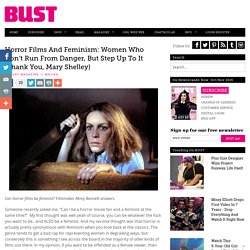
Would we even have monster movies as we know them today, were it not for a woman? In the year 1818 at the startlingly young age of 19, Mary Shelley completed her novel, Frankenstein. Not that it’s a competition or anything… but Bram Stoker was a 50-year-old man when he wrote Dracula, and that novel was published decades after Frankenstein was released. Mary Shelley truly paved the way; without a doubt, the single most complex and influential monster story of all time sprang from the mind of a teenage girl. Suddenly, it occurred to me that the teenage girl being the defining trope of the modern horror movie wasn’t a device born from the imagination of a man – and I could see a deeper meaning behind that pattern. The late great (feminist) director Wes Craven famously said, “horror films don’t create fear; they release it. " Why I Won't Write a Review of Suffragette - Film. Suffragette: No people of color allowed.
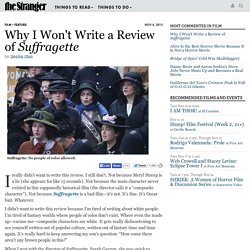
I really didn’t want to write this review. I still don’t. Not because Meryl Streep is a lie (she appears for like 15 seconds). Not because the main character never existed in this supposedly historical film (the director calls it a “composite character”). Drink responsibly; My mind palace is a Tardis. Violence against Indigenous Women: Fun, Sexy, and No Big Deal on the Big Screen. By Guest Contributor Elissa Washuta, originally published on Tumblr Captain Hook kidnaps Tiger Lily in Peter Pan.
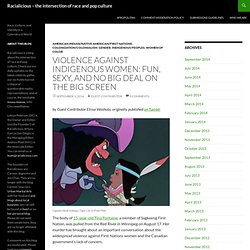
The body of 15-year-old Tina Fontaine, a member of Sagkeeng First Nation, was pulled from the Red River in Winnipeg on August 17. The hidden meanings in kids' movies: Colin Stokes at TEDxBeaconStreet. Chat: Why Her is the most feminist film of the year. Le monde à l'écran. Cinéma. New York Film Academy’s study of gender inequality... Infographic: How to win a Best Actress Oscar (spoiler alert: play a wife) Acting For, Anticipating, Speaking Back to the Male Gaze: In Praise of Adèle Exarchopolous. At the 2013 Cannes Film Festival, the coveted Palme d’Or was awarded to Blue Is The Warmest Color, a three-hour coming-of-age lesbian film.
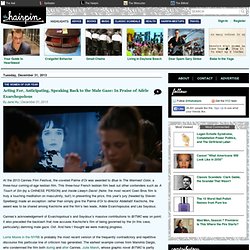
This three-hour French lesbian film beat out other contenders such as A Touch of Sin (by a CHINESE PERSON) and Inside Llewyn Davis! (Note: the most recent Coen Bros film is truly a touching meditation on masculinity, but!) In presenting the prize, this year’s jury (headed by Steven Spielberg) made an exception: rather than simply give the Palme d’Or to director Abdellatif Kechiche, the award was to be shared among Kechiche and the film’s two leads, Adèle Exarchopoulos and Léa Seydoux. Cannes’s acknowledgement of Exarchopolous’s and Seydoux’s massive contributions to BITWC was on point; it also preceded the backlash that now accuses Kechiche’s film of being governed by the (in this case, particularly) damning male gaze. Oof. The Bechdel Test needs an update: We’ve set the bar for female representation too low. 20th Century Fox The Bechdel Test, the brainchild of cartoonist Alison Bechdel, bubbled out of a 1985 comic strip called Dykes to Watch Out For.

The Doubleclicks. The Blood of Carrie: A Feminist Review of the Re-Make. “Carrie is largely about how women find their own channels of power, but also what men fear about women and women’s sexuality.
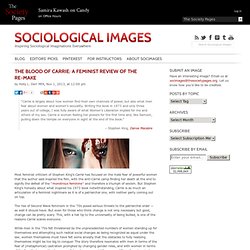
Writing the book in 1973 and only three years out of college, I was fully aware of what Women’s Liberation implied for me and others of my sex. Carrie is woman feeling her powers for the first time and, like Samson, pulling down the temple on everyone in sight at the end of the book.”– Stephen King, Danse Macabre Most feminist criticism of Stephen King’s Carrie has focused on the male fear of powerful women that the author said inspired the film, with the anti-Carrie camp finding her death at the end to signify the defeat of the “monstrous feminine” and therefore a triumph of sexism. Halloween is an Excuse to Rewatch "Hocus Pocus." For many kids of the nineties, Halloween film Hocus Pocus is a favorite: there are ghosts, black cats, Bette Midler, and a whole lot of virgin jokes.
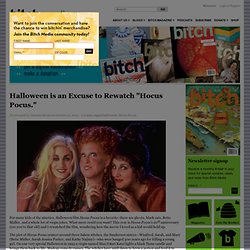
What more could you want? This year is Hocus Pocus’s 20th anniversary (yes you’re that old) and I rewatched the film, wondering how the movie I loved as a kid would hold up. The plot of Hocus Pocus centers around three Salem witches, the Sanderson sisters—Winifred, Sarah, and Mary (Bette Midler, Sarah Jessica Parker, and Kathy Najimy)—who were hanged 300 years ago for killing a young girl. VIFF: H&G. By Jarrah Hodge (Spoiler alert.
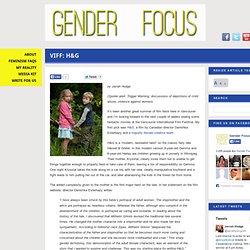
Trigger Warning: discussions of depictions of child abuse, violence against women) It’s been another great summer of film fests here in Vancouver and I’m looking forward to the next couple of weeks seeing some fantastic movies at the Vancouver International Film Festival. The Feminist Power of Female Ghosts. The new movie The Conjuring has been called "scary as hell" and "the summer's scariest movie"—it's so frightening, in fact, that it earned an R rating despite an absence of any explicit violence, sex, gore, or foul language.
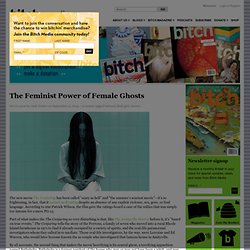
According to star Patrick Wilson, the film gave the ratings board a case of the willies that was simply too intense for a mere PG-13. Part of what makes the The Conjuring so very disturbing is that, like The Amityville Horror before it, it's "based on true events. " The Conjuring tells the story of the Perrons, a family of seven who moved into a rural Rhode Island farmhouse in 1971 to find it already occupied by a variety of spirits, and the real-life paranormal investigators whom they called in to mediate.
Those real-life investigators, by the way, were Lorraine and Ed Warren, who would later become known the as couple who investigated that famous house in Amityville. The Bechdel Test and Women in Movies. Women in Sports Week: Five Reasons Why ‘A League of Their Own’ is “Feminism: The Movie” Written by Myrna Waldron. When one thinks of films featuring women in sports, A League of Their Own is probably the first title that comes to mind. It’s such a well known film that it has been preserved in the Library of Congress for being culturally significant, and “There’s no crying in baseball” is an oft-quoted line.
The film stars Geena Davis, an outspoken feminist, and was directed by Penny Marshall, a well known comedienne/actress. ALOTO was a huge blockbuster, making $132 million in 1992 dollars. (Roughly $213 million in 2012 dollars) This film proves that a woman director can produce a blockbuster AND that films mostly about women (in a traditionally masculine field) can be successful. My three daughters review ‘Turbo’ You’ve heard it all from me before. Basically, if you added up all of the speaking time of the female characters in “Turbo,” you might get 5 minutes of dialogue. “Turbo” reminds me of “Ratatouille” in that animators really seem to believe that it’s easier to convince audiences a talking rat can cook, or a snail can win the Indy 500, than a female character can be a great chef, a champion racer, or the star of her own movie.
Here are my three daughters reviewing “Turbo.” Reel Girl rates “Turbo” ***SS*** for gender stereotyping. Slammin’ Poetry: “A Letter To JK Rowling From Cho Chang” Foreign Film Week: Red, Blue, and Giallo: Dario Argento's "Suspiria" I started getting into film when I was a teenager. Growing up with daily power cuts, both scheduled and unscheduled, is not conducive to childhood as a cinephile, and anyway my parents did not consider film a “real” art like literature or music – I can vividly remember being forced, at age seven, to quit Video Club and join Chess Club instead, because my mother did not think that sitting around watching videos constituted a worthwhile extracurricular.
(I am still breathtakingly terrible at chess.) So, partly as the cultivation of an indoor hobby in response to the unpleasant British climate, and partly as the world’s meagerest teenage rebellion, I started watching films. Misérable Politics: Why Anne Hathaway Should Go-Away. Image from LesMeanGirls In last year’s Les Miserables, a movie with a lot of famous people in it that will probably win some Oscars, Anne Hathaway plays Fantine, a single mother struggling to provide for her child.
Fantine turns to prostitution in a moment of ultimate desperation, having already sold her hair and teeth—I know I’m not the only hooker whose first response to that was “Wrong order, girl”, but whatever—and she and the audience feel very sad. Women of Color in Film and TV: The Conundrum of Butch-Hottie Michelle Rodriguez. Top Five Fictional Female Athletes. Feminism, Pop-Culture | Posted by Becka W on 02/25/2013. 2013 Oscar Week: 'Brave' and the Legacy of Female Prepubescent Power Fantasies.
2013 Oscar Week: 'Les Misérables': Some Musicals Are More Feminist Than Others. Classic Literature Film Adaptations Week: 'We Need to Talk About Kevin' You know how I said in my review of Into the Wild that it was one of the most recent books I’ve read that disturbed me? We Need to Talk About Kevin is the most recent book I’ve read that disturbed me. The Fabulous History Of Disney Cross-Dressing. Gender and Food Week: Scarlett Johansson Tired of Sexist Diet Questions. This post written by Megan Kearns originally appeared at Bitch Flicks on May 31, 2012.
Gender & Food Week: Extreme Weight Loss for Roles is not "Required" and not Praiseworthy. Women in Politics Week: 'Persepolis' This piece on Persepolis, by Amber Leab, first appeared at Bitch Flicks on July 1, 2009. I rented Persepolis before the recent Iranian election, and have been thinking ever since about the film. Persepolis is adapted from the autobiographical graphic novels written by Marjane Satrapi (which I haven’t read), and represents the first graphic-novel-as-film.
Other graphic novels have been made into films, but none (to my knowledge) have remained as true to form as this. Visually, the film is lovely, stark, and at times deeply disturbing. 10 Characters Whose Genders Were Swapped in Production. 10 Statements 'Shakespeare In Love' Makes About Women's Rights. Female Literacy as a Historical Framework for Hollywood Misogyny. Literacy has long been a powerful tool. For a subjugated group to become literate, freedom, power and representation were surely close to follow.
On the other hand, if those subjugated groups remained illiterate–by force or lack of access–hegemony could be kept intact. Gender Focus – A Canadian Feminist Blog. By Tracy Bealer. Thank God It's Over: An Elegy for Twilight. In its heyday, Dazzled by Twilight operated two stores, a performance space, and a tour of Twilight-related sites around Forks, Washington (population 3,175 and 8.5 Vampires), the former logging town–turned–Twilight fan mecca. Amidst fake conifers (including one carved with "Bella loves Edward" on the trunk), an Astroturf grass floor, and fountains, frenzied fans swooped up shirts emblazoned with slogans like "Bite Me" and "Vampires Only, Please," as well as posters, mugs, bumper stickers, and jewelry.
Please, 'Turn Me On, Dammit!" The 2011 Norwegian film, Turn Me On, Dammit! Daddy Issues: Three Men, A Baby, And A Surprisingly Progressive Plot. Three Men and a Baby isn't the first pop cultural example of a male primary caregiver, but it is arguably the most iconic and definitely one of the most successful. Released in 1987, it was the first Walt Disney Studios production to gross over $100 million domestically, taking $168 million worldwide and making men with kids a hot proposition. I loved the movie as a kid, but I dreaded re-watching it. I imagined it to be rife with gender stereotyping, goofy gags demonstrating that men can't cope with babies, and jokes about the how "emasculating" being a father can be.
Wreck-It Ralph Is Flawed, But Still Pretty Feminist. Horror Week 2012: Top 10: Best Female-Centered Horror Films. Horror Week 2012: Roundup of Horror Week 2011. The Terror of Little Girls: Social Anxiety About Women in Horrifying Girlhood. Horror Week 2012: 7 Great Heroines from Scary Movies. Horror Week 2012: A Brief Feministory of Zombie Cinema. The Roundup. Reel Girl’s list of monster movies starring females « Reel Girl. Women and Gender in Musicals Week: My Top 6 Favorite Female Empowerment Songs in Musicals. The Best and Worst of Girls Dressed As Guys in Film. Women and Gender in Musicals Week: Snow White and the Seven Dwarfs. Women and Gender in Musicals Week: Despite an Intelligent Heroine, Beauty Obsession, Sexism & Stockholm Syndrome Taint Disney's 'Beauty and the Beast' Women and Gender in Musicals Week: Aladdin. Women and Gender in Musicals Week: Cinderella. Women and Gender in Musicals Week: The Little Mermaid. Women and Gender in Musicals Week: The Nightmare Before Christmas.
Women and Gender in Musicals Week: Accidental Feminism in 'Mary Poppins' Women and Gender in Musicals Week: The Reception of Corpse Bride. Women and Gender in Musicals Week: The Lion King: Just Good, or Feminist Good? The Resident Evil Series Proves The Bechdel Test Does Not Measure Quality. The Four Mothers of 'Hanna' Le test Bechdel. Tropes vs. Women: #3 The Smurfette Principle. Teenage-feminist.blogspot.ca/2011/06/pop-culture-decoded-feminist-frequency.html.
7 Feminist Take-Aways From the Final Harry Potter Movie. Saturday Vids: Marry Me. Movies For Ladies. Bitch Flicks: Movie Preview: Tomboy. Bitch Flicks: Horror Week 2011: The Roundup. Bechdel Test. Bitch Flicks: YouTube Break: The Twilight Saga: An Interview with Dr. Natalie Wilson. Méchants et méchantes chez Disney (1) : Femmes fortes. Hunger for the classic women heroes. An Imagined Girls Night With Katniss Everdeen, Hermione Granger, Bella Swan And Buffy Summers.
Race, Representation, & Reactions to The Hunger Games. Katniss Everdeen: The First Post-Girl Power Hero. Bitch Flicks: Reproduction & Abortion Week: The Roundup.
Bitch Flicks: Women in Science Fiction Week: Mary Svevo: 'Eternal Sunshine of the Spotless Mind’s Other Strong Female Character. Bitch Flicks: Women in Science Fiction Week: 'Splice': Womb Horror and the Mother Scientist.